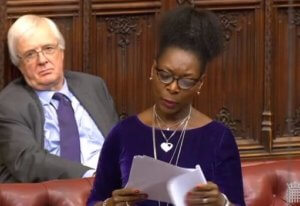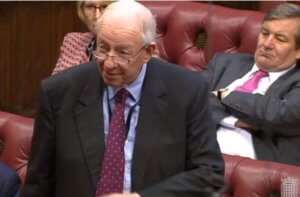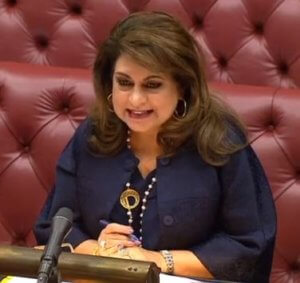Benjamin: the Commonwealth will be stronger if we end frozen pensions
March 17, 2017 Frozen Pensions 5 Comments
 On Thursday 16 March 2017 Liberal Democrat Peer, Baroness Benjamin, took advantage of a House of Lords debate on the Commonwealth to call on the Government to address the issue of frozen British pensions before hosting the Commonwealth Heads of Government meeting next year.
On Thursday 16 March 2017 Liberal Democrat Peer, Baroness Benjamin, took advantage of a House of Lords debate on the Commonwealth to call on the Government to address the issue of frozen British pensions before hosting the Commonwealth Heads of Government meeting next year.
Benjamin, a member of the APPG, and longstanding campaigner on this issue, described frozen pensions as a “national shame and a great injustice”.
She noted that:
“Frozen pensions remain a rare diplomatic grievance and that many Commonwealth leaders are openly puzzled by our approach to our own citizens abroad. We will need to do trade deals with these countries in the next few years, and this issue is likely to be raised time and again in this context.”
Baroness Benjamin went on to argue:
“One of the greatest benefits of the Commonwealth to Great Britain is surely the continuing economic and cultural ties that the countries in it have with the United Kingdom, and vice versa. Generally, what has preserved these links has undoubtedly been the historic and continuing movement of people. But many British people who decide to leave the UK and retire elsewhere—for a variety of reasons—are in for a nasty shock.
She recognised the anger within the expatriate community:
I know from my correspondence bag that mild bewilderment quickly turns to an understandable anger and resentment when those who have worked all their lives in the UK discover, often only after having moved overseas, that they will be landed with a frozen pension. It does not take great intelligence to work out the impact of pension freezing: incomes fall in real terms year-on-year.
She suggested that “It really is a myth that all Brits who live overseas are wealthy” before giving an example of the financial impact of frozen pensions and spelling out the implications for the poorest:
“People migrate for many different reasons—sometimes for work, sometimes for health reasons, and often to be closer to their families, to help with grandchildren. The last thing they want to be is a financial burden, but without an uprated pension, frozen pensioners are losing their independence and facing pensioner poverty, which should shame us all.”
Concluding her speech Baroness Benjamin argued:
“The Commonwealth will surely be stronger if Britain recognises that it cannot expect only to enjoy the benefits of membership when it needs it, but that it must also meet its obligations when people move the other way.”
 Conservative Peer, Lord Goodlad, a former High Commissioner to Australia and now President of the Overseas Service Pensioners Association, spoke after Baroness Benjamin and offered his support. He said:
Conservative Peer, Lord Goodlad, a former High Commissioner to Australia and now President of the Overseas Service Pensioners Association, spoke after Baroness Benjamin and offered his support. He said:
“I very much share her concern about the overseas pensioners to whom she referred and about whom I was greatly concerned when I was in Australia. She is quite right that the Government now have an opportunity to look at the issue again.”
 Summing up for the government, Baroness Mobarik, responded to the frozen pension issue with the traditional government lines:
Summing up for the government, Baroness Mobarik, responded to the frozen pension issue with the traditional government lines:
“Uprating state pensions overseas is a long-standing policy of successive Governments. This has been the case for almost 70 years and there are no plans to change the policy.”
Baroness Benjamin challenged her to confirm whether the Government would apply it’s frozen pension policy to EU-resident British pensioners after Brexit, saying:
“If it is going to be changed for one group, it is not fair to the other.”
Baroness Mobarik somewhat ducked the question by answering:
“I can say only that this is outwith the scope of this debate. I am afraid that I am not able to give the noble Baroness any more than I have already.”
A video of Baroness Benjamin’s contribution can be watched here.
Baroness Benjamin’s full speech is copied below:
“My Lords, I declare an interest as a vice-president of the Royal Commonwealth Society, and I thank the noble Baroness, Lady Anelay, for securing this important debate. I am a great admirer of her work at the Foreign and Commonwealth Office and I appreciate her personal commitment to strengthening the Commonwealth, which is very close to my heart. That commitment will surely only gain in importance as Britain looks to a new future outside the EU. However, I raise an issue on which I would like a change of approach from the Government ahead of the Commonwealth Heads of Government Meeting next year. That issue is frozen British state pensions, about which I have spoken several times in this House.
The freezing or active exclusion of some British people who live overseas from the annual uprating adjustments to state pensions is a national shame and a great injustice. It could affect any British citizen. The impact is predominantly felt by recipients living in the Commonwealth. In fact, of the 550,000 British state pensioners living with a frozen pension worldwide, 520,000 live in the Commonwealth. That includes 247,000 in Australia, 144,000 in Canada, 65,000 in New Zealand and 36,000 in South Africa. There are substantial numbers in other countries too—India, Pakistan, Nigeria, Malaysia, Antigua, St Lucia, Montserrat and other overseas British territories. The list goes on and on.
Let us be very clear. As a country, we, like other modern nations, rightly recognise that entitlement to a state pension should continue when a person moves overseas. That entitlement is linked to national insurance contributions made over the years, not to place of residence. But Britain is currently alone in our uniquely inconsistent approach when it comes to uprating policy. While our pensioners at home benefit from the triple lock, our pensioners overseas face a bewildering lottery of entitlement. Those who live in the EU, or more accurately the EEA, are protected by the social security provisions of the single market, and continue—at least for now—to get their pensions uprated as they would at home. So too do those living in a handful of other countries, including America, Turkey, Israel and the Philippines, where historic bilateral arrangements are in place. But for British pensioners living in most of the Commonwealth, their state pensions are frozen, with recipients destined to receive the same weekly rate for as long as they remain overseas.
One of the greatest benefits of the Commonwealth to Great Britain is surely the continuing economic and cultural ties that the countries in it have with the United Kingdom, and vice versa. Generally, what has preserved these links has undoubtedly been the historic and continuing movement of people. But many British people who decide to leave the UK and retire elsewhere—for a variety of reasons—are in for a nasty shock. In the Caribbean, for example, one of the biggest constant issues that British high commissioners have to deal with is that of frozen pensions.
I know from my correspondence bag that mild bewilderment quickly turns to an understandable anger and resentment when those who have worked all their lives in the UK discover, often only after having moved overseas, that they will be landed with a frozen pension. It does not take great intelligence to work out the impact of pension freezing: incomes fall in real terms year-on-year. For the first few years it is an inconvenience but, as time goes by, it is a more serious concern. I met an 85 year-old recently who had had their state pension frozen since their retirement to Canada in 1998. At that time the state pension was £64.70 a week, and that is therefore what he continues to receive to this day. He is £25,000 poorer today than he would have been with an uprated pension and now, understandably, struggles to get by on his own income without the support of his family. He is, sadly, not alone. There are many older—and, as a result, poorer—frozen pensioners out there.
It really is a myth that all Brits who live overseas are wealthy. On the contrary, many rely on their state pension income just as they would at home. People migrate for many different reasons—sometimes for work, sometimes for health reasons, and often to be closer to their families, to help with grandchildren. The last thing they want to be is a financial burden, but without an uprated pension, frozen pensioners are losing their independence and facing pensioner poverty, which should shame us all.
We are invited today to debate how the UK might strengthen its relationship with the Commonwealth. It is a credit to the Minister that relations with the countries of the Commonwealth are generally so friendly. But the noble Baroness will be aware that frozen pensions remain a rare diplomatic grievance and that many Commonwealth leaders are openly puzzled by our approach to our own citizens abroad. We will need to do trade deals with these countries in the next few years, and this issue is likely to be raised time and again in this context.
I did not want to mention the “B” word in this debate, but there is no way to avoid it. The Brexit process is also likely to bring the frozen pension issue to the fore. Many of the 492,000 retired British expats living in the EEA are increasingly concerned that the Government have not provided more reassurance to them. They are living in fear that, without the legal protections of the single market, they too will end up with frozen pensions like their Commonwealth counterparts. In fact, when I asked the noble Baroness, Lady Altmann, about this matter in the House last year, she was very clear that state pensions are uprated,
“only where we have a legal requirement to do so”.—[Official Report, 24/2/16; col. 251.]
My understanding, therefore, is that the Government will now either need to determine a legally binding social security deal as part of the exit package or be forced to act unilaterally to maintain uprating rights for EU-resident British pensioners. Either way, I propose that the Government should take this opportunity—when so much else is up in the air—to take a more fundamental look at their approach to payment of the state pension overseas. A modern, global Britain should surely recognise that the movement of its people is a good thing. A modern state pension system should recognise, support and encourage this, especially at a time when our ageing population is putting increasing strains on public services here at home.
In the case of the Commonwealth, with increasing numbers of those who came to the UK in the 1950s, 1960s and 1970s now considering a return in their retirement years, there is surely an obligation not to penalise them, while allowing full rights elsewhere. Many of them helped to make Britain great over the years. The Commonwealth will surely be stronger if Britain recognises that it cannot expect only to enjoy the benefits of membership when it needs it, but that it must also meet its obligations when people move the other way. Will the Government consider putting right this injustice as soon as possible? I believe that change on this issue is possible and would be the right thing to do, as it would do much to strengthen Commonwealth relations in years to come. This should be part of our legacy for our Commonwealth family. I look forward to hearing what the Minister has to say on this issue.”

john west
March 20, 2017 - 9:27 am
After the usual disgusting and standard reply from the Government, not only this one, but several other Governments and Labour, Liberal and most of the others, apart from the SNP.
Hang your heads in shame and an absolute National disgrace, how we British born and bred are “treated”.
Yes billions spent on Foreign Aid each year and each year growing and every Tom, Dick and Sally coming into the UK and getting benefits galore for ABSOLUTELY ZERO CONTRIBUTIONS.
Disgusting and vile and we live in the 22nd Century not the 17th.
Thousands upon thousands previously has this been stated.
Robin & Denise Davidson
March 20, 2017 - 2:42 pm
‘The government has been treating pensioners with contempt for 70 years and we’re not going to stop now’, SHAME on you. If you took that attitude we’d still have slavery, no voting rights for women etc.
DO THE RIGHT THING.
Jennifer McIntyre
April 10, 2017 - 10:28 pm
I wonder if this anomaly will be corrected in my lifetime? My widowed Mother was sadly affected when she came out to live with us in 1975, receiving only £10 a week until she died 36 years later, despite having paid an extra ‘stamp’ as advised when having to work full time when widowed at 49 1/2 years ( had to be 50 to get widow’s pension). When she returned to Britain for a holiday to see family, she received the full pension for the time she spent there! My quarterly British pension is equivalent to my fortnightly Australian one! Time is ticking – I’m 72!
Pamela Kendrick
April 12, 2017 - 2:29 am
I have been faithful to the hope that Britain will honour its frozen pensioners who made contributions whilst we lived and worked there. I am a fit and capable pensioner, who teaches refugees at the public library. I shall be calling on medical resources from my chosen commonwealth country. I also thank BPiA and those members of the British government and parliament who understand we must have a resolution to this very long, outstanding and unfortunate situation as soon as possible. i.e. you wouldn’t want us to pop off, would you? Or would you?
Pamela Kendrick
April 12, 2017 - 2:37 am
I shall not be calling on my chosen Commonwealth country to provide expensive medical contributions as I keep fit. I teach English to refugees and hope to be of use in my retirement. I also thank BPiA for their long and helpful contributions to our cause. Also those members of the British government and parliament who realize this long, outstanding matter must be resolved in our favour, bearing in mind that we have already made our National Insurance contributions before we left England.